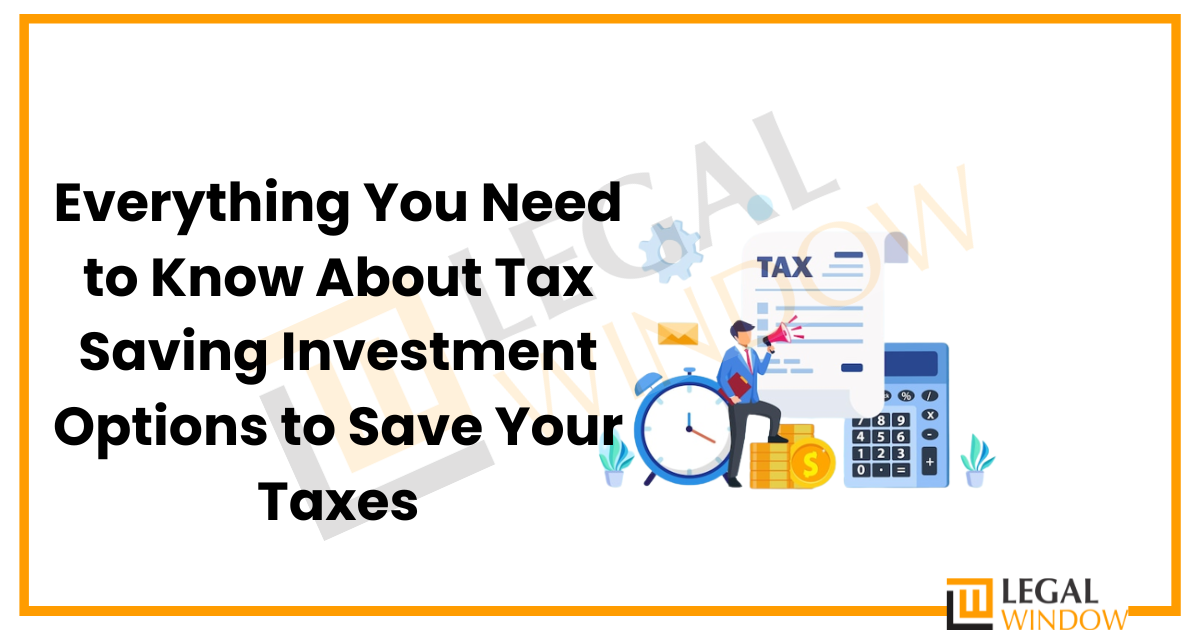Everything you need to know about Tax Saving Investment Options to save your Taxes
- September 23, 2023
- Finance Company

One of the powerful strategies to lower your taxable liability is by investing in Tax Saving Investment Options. These instruments not only help you grow your wealth but also offer substantial tax benefits, making them an essential component of a well-rounded financial portfolio. There is numerous tax saving schemes available that your CA might tell you to lower your Taxable liability. Apart from saving taxes they also offer numerous benefits to the individual who takes the assistance of these tax saving schemes. In this article, we will discuss tax-saving investment options prevailing in India.
| Table of Content |
Understanding Tax-Saving Investment Options
As the name also suggests, Tax saving investment options, are one of the financial instruments that help the individual to lower their tax obligation and they also provide opportunities to individuals to save their taxes under the Income Tax Act, 1961. The main objective of these tax saving schemes is to enhance the savings of the individual, while simultaneously contributing to the economic growth of the country.
Also read our Article on: Tax Planning for Individuals under Income Tax Act, 1961
Importance of Tax-Saving Options
The following is the importance of tax-saving options:

- Reducing Tax Liability: The primary advantage of these investments is the ability to lower your taxable income, which in turn reduces the amount of tax you owe to the government.
- Wealth Accumulation: Tax-saving investments offer an opportunity to grow your money over time.
- Diversification: These investment options span various asset classes, such as equity, debt, and hybrid funds, allowing investors to diversify their portfolios and manage risk effectively.
- Financial Goals: By investing in tax-saving options, individuals can align their tax-saving strategies with their financial goals, such as retirement planning, purchasing a home, or funding higher education.
- Stimulating the Economy: Governments use tax incentives to encourage citizens to invest, which in turn aids in economic growth by channeling funds into productive sectors.
Why Tax Saving Investment Options Matter?
Taxes are a crucial source of revenue for governments to fund public services and infrastructure as per the Income Tax Department and the statute that deals with taxes in India is Income Tax Act, 1961. However, tax liabilities can sometimes put a significant burden on individuals and businesses. To incentivize savings and investments, governments often offer tax deductions and exemptions on specific financial instruments. These instruments are collectively referred to as “tax saving schemes”
Tax saving schemes undertakes two things:
- Wealth creation
- Reduction of taxable income
Hence, by using tax saving schemes your taxation liability decreases.
Popular Tax-Saving Investment Options
Numerous tax-saving investment options are available, each catering to different risk appetites, investment horizons, and financial goals. Some of the best tax saving options includes:
- Equity-Linked Savings Schemes (ELSS): ELSS is an important tax saving scheme that has a lock-in period of 3 Years and during this period the investors are not allowed to withdraw the funds invested by them. ELSS has the potential to give a higher return due to equity; also it offers several tax benefits under Section 80 C of the Income Tax Act, 1961.
- Public Provident Fund (PPF): PPF is a government-backed savings scheme with a tenure of 15 years. It offers both safety and steady returns. Investments in PPF are eligible for deductions under Section 80C, and the interest earned, as well as the maturity amount, are tax-free.
- National Savings Certificate (NSC): NSC is an important tax saving scheme that has a lock-in period ranging from 5- to 10 years, depending upon the variant. Also, the interest received by way of NSC is compounded annually and reinvested. Because of this reason, it becomes an attractive option among investors. Also, it offers several tax benefits under Section 80 C of the Income Tax Act, 1961.
- Sukanya Samriddhi Yojana: This scheme is designed to encourage parents to save for their girl child’s education and marriage expenses. It offers an attractive interest rate and comes with a tenure of 21 years or until the girl child’s marriage, whichever is earlier. Contributions are eligible for deductions under Section 80C.
- Tax-Saving Fixed Deposits: Many banks offer fixed deposits with a 5-year lock-in period that qualify for deductions under Section 80C. While they provide fixed returns, the interest earned is taxable.
- National Pension System (NPS): NPS is a retirement-focused investment that offers exposure to equities and debt. It provides tax benefits under Section 80CCD (1) for employee contributions and an additional benefit under Section 80CCD (2) for employer contributions.
- Unit Linked Insurance Plans (ULIPs): ULIPs combine insurance with investment and offer potential market-linked returns. They come with a lock-in period of 5 years and are eligible for deductions under Section 80C.
- Employee Provident Fund (EPF): EPF is a mandatory savings scheme for salaried individuals. Both the employee’s and employer’s contributions are eligible for deductions under Section 80C. The interest earned is tax-free.
Tax Saving Investments other than 80C of Income Tax Act, 1961
There is some tax saving investments other than 80C of Income Tax Act, 1961, offering a diverse range of options for individuals to explore. Some of the tax saving investments other than 80C of Income Tax Act, 1961 are as follows:
- Section 80D – Health Insurance Premium: While 80C primarily focuses on investments, Section 80D incentivizes you to prioritize your health by offering deductions on health insurance premiums. Under this section, you can claim deductions for premiums paid for health insurance policies covering yourself, your family, and even your parents. This not only aids in reducing your tax liability but also ensures you have comprehensive health coverage in times of need.
- Section 24(b) – Home Loan Interest: Purchasing a home is a significant financial commitment, and Section 24(b) recognizes the financial burden by allowing deductions on the interest paid on home loans. Taxpayers can claim up to ₹2 lakh in deductions on the interest paid for a self-occupied property, and there is no limit for properties that are rented out. This provision is especially valuable for those with substantial home loan obligations.
- Section 10(14) – HRA (House Rent Allowance): If you’re a salaried individual and receive HRA as a component of your salary, you can claim exemptions on the rent paid towards your accommodation. This provision can be particularly advantageous for individuals who reside in rented accommodations in urban areas where housing costs are higher. By using this exemption, you can substantially reduce your taxable income.
- Section 80E – Education Loan Interest: For those repaying education loans, Section 80E offers a way to ease the financial burden of interest payments. Interest paid on education loans can be claimed as deductions under this section, without any upper limit. This provision encourages higher education and empowers taxpayers to invest in their future without worrying about the immediate tax implications.
- Section 80G – Charitable Donations: Contributions towards charitable organizations not only benefit society but can also be used to lower your tax liability. Under Section 80G, taxpayers can claim deductions for donations made to eligible charitable institutions. However, it’s important to verify the authenticity of the organizations and ensure that the donations comply with the specified limits and criteria.
- Section 80TTA and 80TTB – Interest on Savings and Fixed Deposits for Senior Citizens: These sections cater to taxpayers’ savings interests. While Section 80TTA allows individuals and HUFs to claim deductions on interest earned from savings accounts, Section 80TTB specifically benefits senior citizens by providing deductions on interest earned from savings deposits, fixed deposits, and recurring deposits.
Factors to Consider Regarding Tax Saving Investment Options
The following are the factors to consider regarding Tax Saving Investment Options:
- Risk Tolerance: Every investment carries a certain level of risk. It’s essential to evaluate your risk tolerance before committing to any tax-saving investment.
- Lock-in Period: Many tax-saving investments come with a lock-in period, during which you cannot withdraw the funds without penalties.
- Diversification: Don’t put all your eggs in one basket. Diversifying your tax-saving investments across different asset classes can help spread risk and potentially enhance returns. You should consider various options like ELSS, PPF, National Pension System (NPS), and tax-saving Fixed Deposits to create a balanced portfolio.
- Long-term Goals: Your investment choices should align with your long-term financial goals. If you’re investing for retirement, options like NPS or PPF might be suitable due to their longer-term nature. For shorter-term goals, ELSS and Fixed Deposits could be more appropriate.
- Tax Implications: While the primary goal is to save on taxes, understanding the tax implications of your investments is crucial. Different investments have varying tax treatment upon maturity or withdrawal. For instance, the interest on PPF is tax-free, while gains from ELSS are subject to capital gains tax.
- Flexibility and Liquidity: Evaluate how easily you can access your funds in case of emergencies. Investments like ELSS have a shorter lock-in period, while investments like National Savings Certificate (NSC) have a fixed lock-in with limited liquidity options.
- Professional Advice: Seek guidance from financial advisors or tax professionals. They can help you navigate the complex landscape of tax saving schemes, considering your financial situation, goals, and risk tolerance.
End Note
Tax-saving investments are an crucial part of a comprehensive financial plan. By strategically allocating your funds to these instruments, you can simultaneously achieve your long-term financial goals and optimize your tax liabilities. However, remember that while tax benefits are crucial, your investment decisions should also align with your risk appetite, financial goals, and overall wealth-building strategy.
Consulting with a Tax Consultant can provide valuable insights and help tailor your investment choices to your unique circumstances. You can consult with Best Tax Consultants at Legal Window. For consultation connect with them at 072407-51000 or email admin@legalwindow.in
Company Secretary and diligent learner deeply immersed in the world of corporate law, compliance, and governance with a focus on developing a robust foundation in legal principles and corporate practices. Passionate about exploring the intricacies of company law, regulatory compliance, and corporate governance.
Categories
- Agreement Drafting (23)
- Annual Compliance (12)
- Change in Business (37)
- Company Law (149)
- Compliance (90)
- Digital Banking (3)
- Drug License (3)
- FEMA (17)
- Finance Company (42)
- Foreign Taxation (9)
- FSSAI License/Registration (14)
- GST (122)
- Hallmark Registration (1)
- Income Tax (207)
- Latest News (34)
- Miscellaneous (169)
- NBFC Registration (8)
- NGO (18)
- SEBI Registration (6)
- Section 8 Company (10)
- Start and manage a business (26)
- Startup/ Registration (133)
- Trademark Registration/IPR (48)
Recent Posts
- NGO Registration in West Bengal July 29, 2024
- Trademark Registration In Jodhpur July 22, 2024
- Trademark Registration in Agra July 15, 2024
About us
LegalWindow.in is a professional technology driven platform of multidisciplined experts like CA/CS/Lawyers spanning with an aim to provide concrete solution to individuals, start-ups and other business organisation by maximising their growth at an affordable cost.









